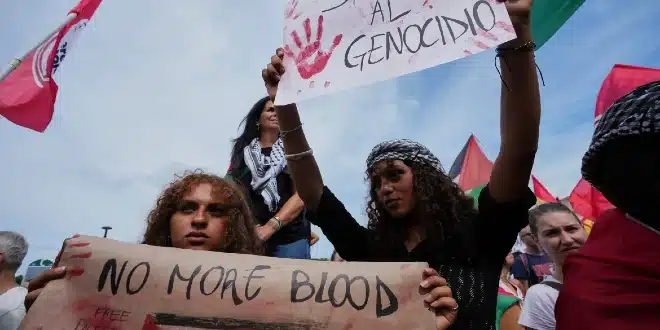Cities across Italy were rocked by demonstrations, strikes, and blockades on Monday as thousands rallied in solidarity with Palestinians and demanded stronger action against Israel. The protests, which spread from Rome to Milan, Naples, and beyond, were organized by unions and activist groups calling for economic sanctions and diplomatic pressure in response to what they described as “genocide in Gaza.”
Nationwide Demonstrations and Strikes
In Rome, hundreds of high school students filled the area outside Termini train station, waving Palestinian flags and chanting slogans such as “Free Palestine!” Their presence underscored how the conflict has struck a chord with young Italians. Seventeen-year-old Michelangelo said he wanted to stand with “a population that is being exterminated,” while 18-year-old Francesca Tecchia noted it was her first protest, stressing that the crisis in Gaza “is too important to ignore.”
Workers joined the demonstrations as well. Federica Casino, 52, marched alongside the students, declaring that “Italy must come to a standstill today” to honor the lives lost, particularly Gaza’s “dead children and destroyed hospitals.” She criticized Italy’s leadership for talking about peace but taking little tangible action.
Beyond the capital, rallies were reported in Florence, Turin, Milan, Bari, Palermo, and Naples. In Genoa and Livorno, dockworkers blocked ports in protest, halting commercial activity to highlight their demand for sanctions against Israel. Public transportation was also disrupted in Rome, where buses were canceled and metro services slowed, amplifying the impact of the strike.
Italy’s Political Balancing Act
The protests unfolded just as France, along with other Western nations, prepared to push for official recognition of a Palestinian state at the United Nations General Assembly in New York. On Sunday, the United Kingdom, Australia, and Canada announced their recognition of Palestinian statehood, piling diplomatic pressure on Israel as its offensive in Gaza continues.
Italy, however, has adopted a more cautious approach. Prime Minister Giorgia Meloni’s government, closely aligned ideologically with U.S. President Donald Trump, has resisted calls for immediate recognition of a Palestinian state. While Meloni has expressed repeated “concern” about Israel’s military campaign, her government has also signaled reluctance to support proposed European Union trade sanctions against Israel. Officials in Rome have stated that recognition is not on the table “for the moment.”
War in Gaza Escalates
The protests come against the backdrop of one of the most devastating chapters of the Israeli-Palestinian conflict in decades. Nearly two years into Israel’s military campaign in Gaza, the enclave has been left in ruins. According to the health ministry in Hamas-run Gaza, more than 65,000 Palestinians — the majority of them civilians — have been killed since the war began. The United Nations has deemed these figures credible.
Israel maintains that its operation is aimed at eliminating Hamas, the Islamist group that launched the October 7, 2023, attacks, which killed 1,219 people in Israel, most of them civilians. Defense Minister Israel Katz reiterated in recent days that Israel’s objective is to “annihilate” Hamas, even as international calls for restraint grow louder.
What This Means
Italy now finds itself caught between public outrage, which is increasingly vocal in the streets, and its political alliances, which tie it closely to Washington and Israel. For protesters, Monday’s mobilization was a way to pressure Rome to align itself with the growing list of Western countries recognizing Palestinian statehood.
As international attention shifts to the UN General Assembly, Italy’s cautious stance will be closely watched. Whether Rome maintains its position or bows to mounting domestic and international pressure could shape both its standing in Europe and its role in future Middle East diplomacy.


